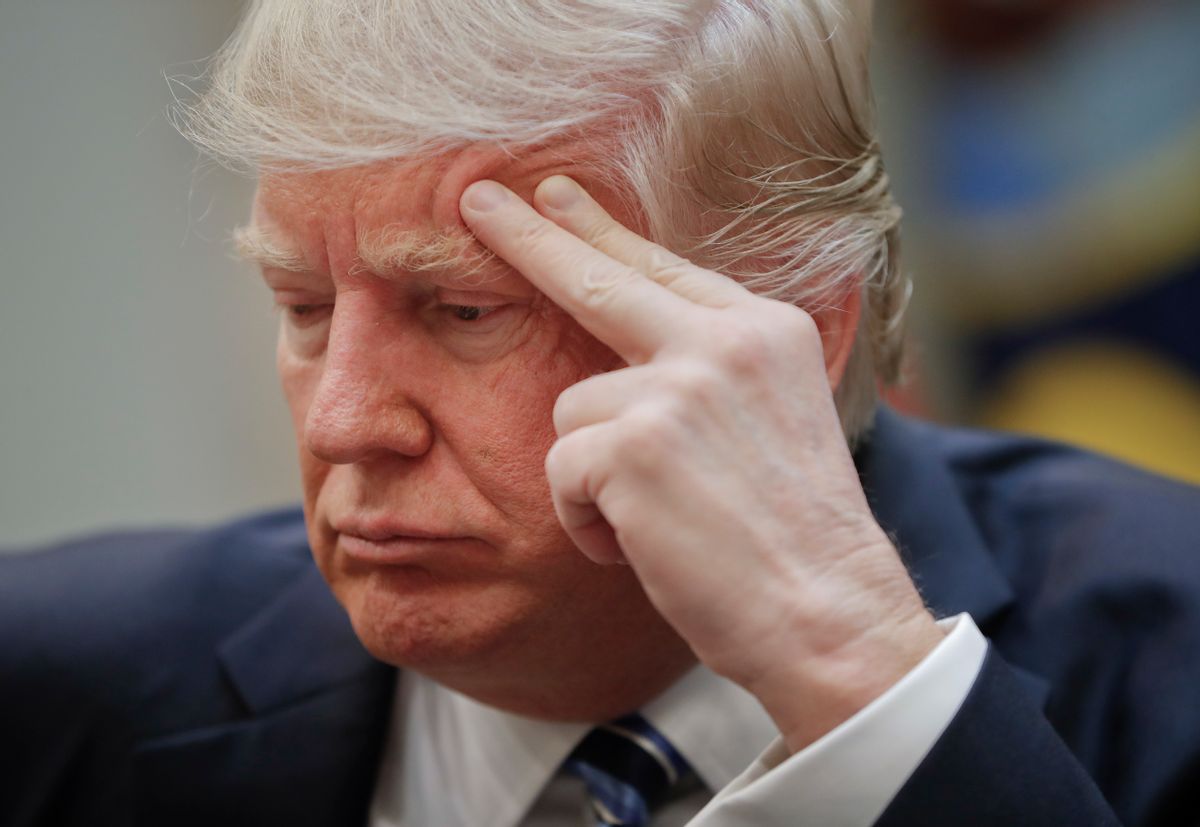President Donald Trump's plan for protecting and creating American jobs has taken three forms while he's been in office.
First, he talks up American jobs and browbeats companies relocating to Mexico or overseas. While Trump exaggerates and takes credit when he doesn’t deserve it, he regularly ties his image and his presidency to the story of jobs in America, a politically astute move. But Trump needs more than rhetoric on jobs if he wants to protect Republican congressional majority in 2018 and have any chance of reelection in 2020. He needs to take measures that actually create jobs.
The second plank of Trump’s job program is the much touted and much delayed “trillion-dollar infrastructure jobs plan,” favored by White House adviser Steve Bannon. However, the plan has yet to be drawn up and is not scheduled for presentation until next year. It remains to be seen if Trump and Bannon can harmonize their infrastructure jobs program with that of Senate Democrats or the American Society of Civil Engineers. So far, Trump has made health care and tax reform a higher priority and shown little ability to work with anybody on passing legislation.
The third and most substantive part of Trump’s job plan is buried in current tax reform legislation: a tax on imported goods that (Trump says) will favor U.S.-based manufacturers and exporters and thus create jobs in the United States. You wouldn't know it from the headlines, but with "tax reform" now trumpeted as the administration's top legislative priority, Trump's jobs agenda is up for approval on Capitol Hill for the first time.
Conservatives split
Trump is already faltering, even in his messaging. To describe the administration's top priority as "tax reform," and not "job creation" reflects Paul Ryan's priorities more than Trump's. The label weakens the president's ability to sell a radical change in corporate tax policy that is already proving as divisive as Trump's failed health care bill.
Trump's salesmanship is not particularly aggressive or compelling. In an interview with Reuters in February, Trump embraced the notion of an import tax, also known as a "border adjustment tax."
“I certainly support a form of tax on the border,” Trump said. He argued the measure would encourage companies to bring manufacturing jobs back to the United States, a critical component of his platform. Even when announcing his adminstration's pivot to tax reform after the health care debacle, Trump didn't talk much about the import tax or jobs.
As with Obamacare repeal, the most right-wing factions on Capitol Hill are not buying into Trump’s vision.
"Conservative Split Over Import Tax Imperils Trump’s Overhaul," The New York Times reported on Sunday.
A month ago I asked, "Who Wins? Trump v. the Koch Brothers on Jobs." So far the answer, according to the Times, is the Koch brothers. Supported by Walmart and other giants of the retail industry, Koch family political front groups are moving to stifle Trump’s tax plan before it ever gets out of the House Ways and Means committee.
What Trump touts as a jobs plan, one Koch-funded group defines as a tax increase on millennials.
Another Koch-funded organization, Americans for Prosperity, is running TV ads denouncing the border adjustment tax (or BAT) as a $1.2 trillion tax increase on seniors and the working poor.
The split over Trump’s tax and jobs plans, says the Times,“is exposing the broader ideological divide between nationalist policies embraced by Mr. Trump and the traditional small-government movement that his election ejected from the driver’s seat of Republican policy-making.”
Trump does have leverage in this negotiation. To enact a tax bill that does not increase the federal deficit but does deliver what Republicans want most — rate cuts for wealthy taxpayers and corporations — Congress needs to find some source of new revenue. Hence the import tax.
Trump's challenge
To prevail, Trump will have to convince a majority of the House Ways and Means committee that BAT is worth adopting because it will create American jobs and will not raise prices on imported goods, despite what the local retail business community is saying. And if the House approves the BAT, Trump will have to protect those provisions in the Senate, where opposition is likely to be even stiffer.
That would be a heavy lift for any White House. For a president as disengaged and disorganized as Trump, it seems highly unlikely, if not impossible.
Trump doesn’t have a strong relationship with Ryan, who cares more about tax cuts than job creation. Trump doesn’t have a White House staff capable of coaxing and threatening wavering congress members to come around to his point of view. And he doesn’t have the discipline or the intellect to explain and sell a radical policy change to Congress, much less to the country. It's not something you can do in 140-character bursts.
So the only substantive measure in Trump’s much-touted jobs agenda is at risk of dying a slow and invisible death.
What happens next
Writing tax legislation is one of the slowest and most complex of the lawmaking arts. Congressional leaders have talked about having a tax bill ready to send to the president by August. Whether it will contain any of Trump’s job stimulation measures is already very much in doubt.
One of Trump’s most effective lines on the campaign trail was that the Washington establishment was “all talk and no action.”
If Trump can’t defeat the Koch brothers, pass the border adjustment tax and claim a job creation victory this year, he is going to be vulnerable to the same charge on jobs.




Shares